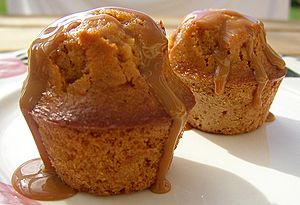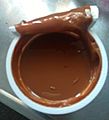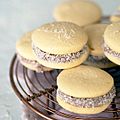Dulce de leche facts for kids
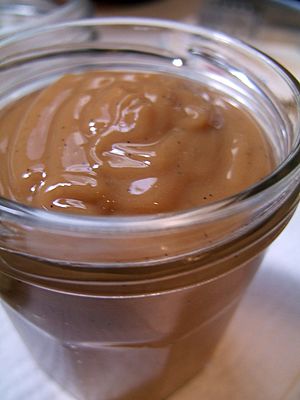
A jar of dulce de leche
|
|
| Alternative names | Arequipe, doce de leite (Brazil), cajeta manjar, manjar blanco, kajmak (Poland) |
|---|---|
| Type | Confectionery |
| Region or state | Latin America, Poland |
| Main ingredients | Milk, sugar |
Dulce de leche (which means "sweet of milk" in Spanish) is a super yummy sweet treat. It comes from Latin America. People make it by slowly cooking milk and sugar for several hours. This process turns the mixture into a thick, creamy sauce. It gets its rich brown color and delicious taste from a natural cooking process. Dulce de leche is often used to top or fill other sweet foods.
In different places, it has other names. Some call it manjar (meaning "delicacy"). Others know it as arequipe. If it's made with goat's milk, it might be called cajeta. There's also a French version called confiture de lait. In Polish cuisine, a similar sweet spread is called kajmak. It's often used on wafers or a special Easter cake called mazurek.
How to Make Dulce de Leche
The simplest way to make dulce de leche is to slowly cook milk and sugar together. You need to stir it almost all the time. As it cooks, the mixture gets thicker and turns a beautiful golden-brown color.
Other things like vanilla can be added for extra flavor. A lot of the water in the milk evaporates during cooking. This makes the mixture much smaller in volume. The amazing change that happens when you cook it is due to two natural browning reactions. These are called caramelization and the Maillard reaction. Caramelization is when sugar browns from heat. The Maillard reaction is when sugars and proteins react together to create new flavors and colors.
Some people try to make a homemade version using a can of sweetened condensed milk. They boil the unopened can for a few hours. However, this method can be very dangerous! If the pot boils dry, the can can get too hot and explode. It's much safer to buy dulce de leche ready-made or make it the traditional way.
Ways to Enjoy Dulce de Leche
You can eat dulce de leche all by itself, but it's usually used with other sweet foods. It's a popular topping or filling for many desserts.
Some common uses include:
- Filling cakes and cookies, like the famous alfajor cookies.
- Topping churros and waffles.
- Serving with fruits like banana.
- Adding to ice creams.
- Spreading on crepes (called panqueques in some places) and toast.
- The French version, confiture de lait, is often eaten with fromage blanc, a fresh cheese.
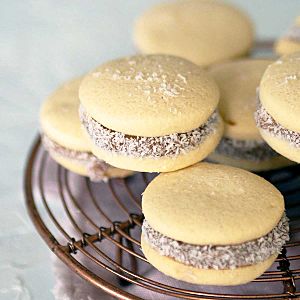
Images for kids
-
Dulce de leche-flavored ice cream
See also
 In Spanish: Dulce de leche para niños
In Spanish: Dulce de leche para niños
 | John T. Biggers |
 | Thomas Blackshear |
 | Mark Bradford |
 | Beverly Buchanan |


